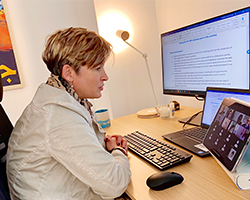WHO/Europe launches caregiver skills training in Kazakhstan to support children with neurodevelopmental delays

WHO
Physical isolation has negatively affected the mental health of many people worldwide during the COVID-19 pandemic. For children with neurodevelopmental delays and disorders (NDD), as well as their parents who already lived in isolated circumstances, the pandemic has exacerbated their social exclusion and impacted their mental and physical well-being. The need to address the treatment access gap for children with NDD existed long before the pandemic, which let WHO develop a fully-fledged programme, which kicked off when it was needed most.
Training for parents
WHO developed the Caregiver Skills Training (CST) programme to empower parents of children with NDD and promote their children’s development. The training was created for parents and other primary caregivers, who usually have no specialized training to address their children’s special needs and promote their development.
Another goal in supporting parent caregivers is to help them build better mental health. Their caregiving responsibilities are often accompanied by stigma and social exclusion, and they can be highly dependent on social assistance because their caregiving responsibilities do not allow them to have a fulltime job. They are also more likely to use their savings on expensive therapy or equipment for their children. Parent caregivers are therefore more at risk from poor mental and physical health.
Hearing the concerns of parent caregivers
Upon adapting the programme to local contexts, WHO’s CST team, led by Medical Officer Chiara Servili, found that the parent caregivers can hold all kinds of beliefs to explain why their children have difficulties in their development. While some may believe that it is a lack of love from their side, others blame the involvement of dark magic.
Self-blame or not, Erica Salamone, a WHO CST programme team member, explained that it is important to address these beliefs. “I have provided guidance around how to elicit these kinds of beliefs and make sure that they are discussed. So that parents feel heard when they talk about these things. Then we can provide them with more factual information, which actually helps their children’s development,” said Erica.
About the CST programme
The CST programme has been adapted and tested in more than 30 countries worldwide, and on 15 February 2021, WHO/Europe and the Kazakh National Centre for Mental Health launched the programme in Kazakhstan. Erica is currently training a team of Kazakh master trainers, who then will work with parent caregivers. The programme will continue for 2 months, with practical training included.
The brilliance of the programme is in its adaptability for use in low resource settings, availability to each family and effectiveness. The training breaks down processes as seemingly simple as feeding, playing and other activities. The children can communicate using an array of different signals. What is essential is to identify them and respond.
“There is a strong emphasis on using everyday activities – meal times, getting dressed, laundry activities, playing with toys and other materials, activities with books – as opportunities to create routines that promote a child’s development,” said Erica. “This has a major effect on parents because they realize that they can use interactions in their everyday life to support their child and help them fulfil their potential. We are beginning to see the evidence that there is an effect on families.”
The programme was informed by an evidence review utilizing a common elements approach and was developed through extensive stakeholder consultation with academic partners and lay reviewers, and an iterative revision process.
New techniques welcomed by trainers
A week after the training began, following webinars introducing the basic CST concepts, prospective trainers were impressed. Lev Kutsenko, a participant and psychologist at the Regional Centre for Mental Health in Karaganda, highlighted the need for and relevance of trainers for parent caregivers.
“For me, as a psychologist in the rehabilitation department, it is of great importance that the CST programme provides an opportunity to train parents raising children with NDD to identify a child’s communication signals, understand their needs and cope with the stress that comes along with their conditions,” Kutsenko said.
Gulchekhra Atazhanova, a paediatric psychiatrist of the Mental Health Centre in Shymkent, stressed that this is the first webinar of its kind for the participants. She expressed her enthusiasm to facilitate the parent–child relationships that have long needed this support.
CST as a public health solution
Despite living in an upper-middle-income country, Kazakh children with NDD still have limited access to treatment. According to Erica, even high-income countries have the same problem because they do not consider treatment can also be a public health matter. The CST programme has the potential to be part of a public health solution to reduce the treatment gap for children with NDD.
“As Kazakhstan strives towards more inclusive education, more person-centred health services and greater social protection for families, I very much welcome the enthusiastic interest of national partners in this innovative WHO programme and I look forward to seeing its uptake and scale-up following this initial training of trainers workshop,” said Dr Caroline Clarinval, WHO Representative and Head of Country Office in Kazakhstan, during her opening speech of the CST programme in Kazakhstan.
This training programme rolled out in Kazakhstan is a good example of the European Programme of Work in action, with WHO working closely with national authorities and experts to ensure that people have access to the health services and support they need to improve their health and well-being.



